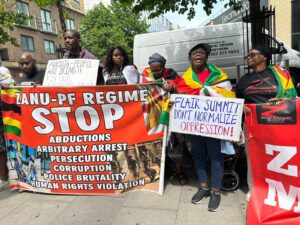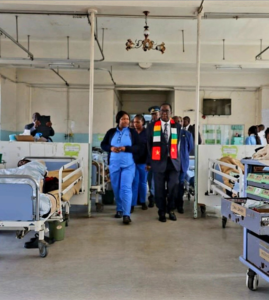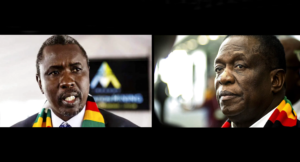FROM KINGMAKER TO ENEMY: THE FALLING OUT OF ZIMBABWE’S STRONGMEN

He stood by him when no one else did. On 6 November 2017, when the late former President Robert Mugabe fired Emmerson Mnangagwa as Vice-President, forcing him to flee to South Africa and face what seemed like the end of his political career, Constantino Chiwenga remained loyal. Two weeks later, Chiwenga put everything on the line—his career, his freedom, even his life—to lead the military coup that removed Mugabe and installed Mnangagwa as president. Without him, Mnangagwa would have never made it to State House.
Chiwenga didn’t stop there. He helped Mnangagwa consolidate power, stood with him through disputed elections in 2018 and 2023, and backed all his policies without question, including the much-hyped but now hollow Vision2030. He even called him Munhumutapa, a royal Shona title meant to elevate Mnangagwa’s status to that of ancient kings. Chiwenga went so far as to kneel before him at the 2022 ZANU PF congress—a public display of absolute loyalty.
Yet today, that same loyalty has been met with betrayal. Mnangagwa is blocking Chiwenga from succeeding him, despite previous plans suggesting Chiwenga would take over after one term. Instead, Mnangagwa is quietly pushing a third-term agenda, planning to stay in power until 2030, with Chiwenga completely sidelined.
The tension between them has now erupted into a full-blown succession war. Mnangagwa is not only refusing to support Chiwenga’s bid to lead—he is actively purging those aligned with him. The removal of Zimbabwe National Army commander Lieutenant-General Anselem Sanyatwe, a key figure in the 2017 coup, is the latest sign. Mnangagwa no longer trusts the men who helped him rise. Just like many leaders after coups—Napoleon, Stalin, Idi Amin, Mobutu, and even Mugabe—he is now eliminating those who know too much, those who could potentially challenge his grip on power.
This kind of betrayal is not new in politics, but it is ruthless. Chiwenga, who once held significant power as Defence Minister, ZDF commander, and war veterans’ boss, now finds himself boxed in. Even as Vice-President, he is being pushed further to the edges of power.
Yes, Mnangagwa did defend Chiwenga when Mugabe wanted him gone. And yes, he gave him considerable control in the early days after the coup. But the truth is, Mnangagwa never intended to share power permanently. Once he secured his position, the purge began—quietly and methodically. Those loyal to Chiwenga are either being removed or sidelined. What was once a powerful alliance has turned into a dangerous rivalry.
Chiwenga’s situation is a cautionary tale. Mugabe warned him, and now those warnings ring true. His loyalty, strength, and sacrifices have not earned him the seat at the top he once envisioned. Instead, they have made him a threat.
The 2030 succession battle is not just about leadership—it’s about betrayal, control, and survival. Mnangagwa’s quiet campaign to stay on reveals a deeper fear of what a Chiwenga presidency could mean. Despite Mnangagwa’s public denials, his actions speak louder. He is doing everything possible to block Chiwenga’s rise.
Zimbabwean politics has always been brutal, but this fallout between two of its strongest men could reshape the future of the country. One thing is certain: Chiwenga may have brought Mnangagwa to power, but he may also be the one pushed out to keep him there.



